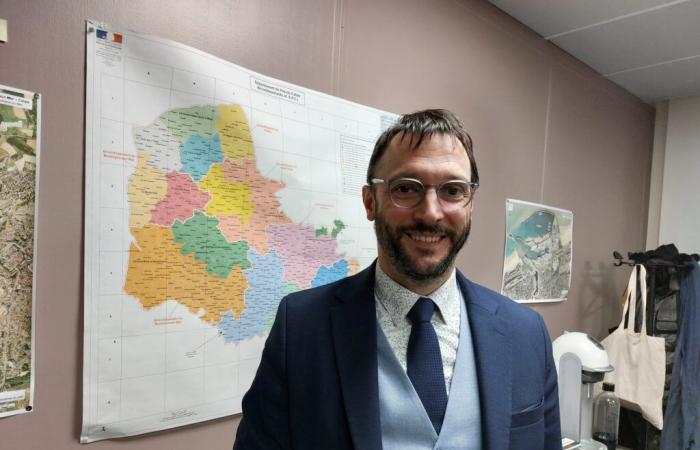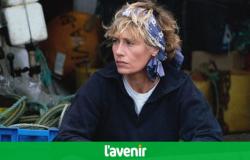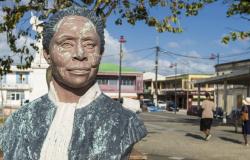
For Édouard Gayet, departmental director of territories and the sea of Pas-de-Calais, there was a before and an after flood.
November 2023, Pas-de-Calais experiences the first episode of a series of floods. Thousand-year-old rains cause a hundred-year flood. Then in January, 50-year rains are enough to trigger a new 100-year flood. Emmanuel Macron and his ministers follow one another on the ground (read our editions from last winter). At the head of the DDTM, Édouard Gayet lives “ a year that counts double ».
The teams are on the front lines with immediate actions and others in the long term, which involves changing certain practices so that “ the territory is more resilient “. Enough to make Belfortain say that the structure he directs is “ at the crossroads of all societal issues. » Rembobinons.
The year is 2004, Édouard Gayet has just graduated. He chose to specialize in agricultural economics and policies. He doesn’t know the agricultural world “ no more than that “. He does have a few distant cousins who combine vines and breeding in the Saône valley, but that stops there for this son of an engineer and a professor. However, he is attracted by the impact of the CAP on the territories, “ how practices change and are influenced by ithe specifies. How the same CAP translates differently depending on the country or even in France “. It is therefore a discovery. in its sociological and economic version » what does the person who passed through Lyon, Paris, Dijon before being assigned to his first post in Orléans in the veterinary services.
Going further north, he then settled in Picardy. Drir, Diren, Dreal, the acronyms follow one another throughout his missions. In the last, he “ enjoys working with the agricultural profession in its diversity “. The dialogues are constructive, “ this is how I carry out actions », he announces.
Acting
Nearly 10 years ago, he returned to the northern route, ending just before the sea: Pas-de-Calais welcomed him as deputy to the director in charge of heritage for the departmental council. “ Listening quality of the interlocutors », « humanly rich », « significant cooperation », the territory is true to its reputation. “ People work together to find solutions. This is true in all areas of Pas-de-Calais. It makes the work constructive: we move forward », he appreciates.
A few years later, he joined the DDTM, first as deputy, then interim and, officially director in 2021. Social housing, driving licenses, drinking water, retreat of the coastline: the files are as rich as varied. What he wants is “ get out of technocracy and implement them intelligently in a given territory “. This requires understanding the people, the territories. He is passionate about the acting that takes place in a room when a solution is constructed. Everyone plays their role with their part to play on the dialogue to be conducted, the way of speaking.
Artificialization
Among the battles to be fought is the fight against artificialization. “ The department is the fifth having consumed the most agricultural, natural and forest land between 2010 and 2020 », does not applaud the DDTM. Especially since the period was “ stable » in terms of employment and population. “ It's a bad place », he judges. Sparse development methods have generated other phenomena such as the devitalization of centers of all sizes which have lost residents to the outskirts. This de facto generates difficulties in maintaining services. “ The negative effects of this urban sprawl are felt in public policies which aim towards more inhabitants and jobs per hectare », he continues, citing housing on the one hand, and business areas on the other.
Another subject: the phenomenon of active erosion and the retreat of the coastline. Keeping it in the same place will cost more and more, he says. “ We must not engage in policies that we cannot carry out. » Around ten coastal communities are affected by significant erosion, he cites, referring to the first purchases of properties exposed to the retreat of the cliff. The repurchase of property also concerns those affected by floods and whose owner has requested it. The DDTM has received 120 applications, half of which have already been validated.
Consistency and fairness
On the agricultural side, “ undeniably there are things to be done regarding simplificationrecognizes Édouard Gayet, including for the administration itself! » So when he has the possibility of creating simple measures (post-flood cash flow aid) or crisis measures (calamities, financial support, etc.), he ensures it: he does it. The latest demonstrations have for him “ consistency » in the background: what do we want to eat? This is a regular concern in the agricultural world: fairness between what we do here and what we import. It always keeps in mind the most fragile farmers, both economically and psychologically, and has a good number of its agents trained to take difficult situations into account. As for the controls, if they “ raise disproportionate concerns “, they are in reality ” generally compliant » and only concern 1% of farms each year (CAP declarations and surface aid).
Before and after 2023 can also be seen on the scale of “ efforts financiers » and the “ implementation » dedicated to the fight against flooding. “ Multiplied by three or four. » Cleanings, repairs to banks, roads, flood expansion zones and even pumps, he quotes. Structural work is 80% financed by the State, emergency and repair work between 70 and 100%, he sees fit to point out. This is what is said.
Louise Tesse
Read also the portrait of his northern counterpart Luc Feret





